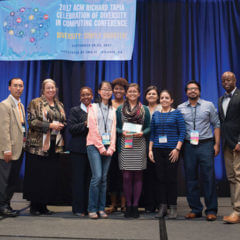The Association for Computer Machinery (ACM) Richard Tapia Celebration of Diversity in Computing Conference has been dedicated to promoting diversity in computer science and connecting minority students with mentors for the past 17 years.
HOW IT STARTED: Founded in 2001 by the Coalition to Diversify Computing (CDC), it began after “this group of people came together and basically went, ‘You know, we have a problem here,’” said Jerri Barrett, director of social media for Center for Minorities and People with Disabilities in Information Technology (CMD-IT), which merged with CDC in 2016 and now organizes the conference. “There’s just such a significant underrepresentation, so the conference was created to really give people the inspiration of role models.”
The Tapia Celebration is named after Richard Tapia, a mathematician and professor in the Computational and Applied Mathematics department at Houston’s Rice University, who directed more underrepresented minority and women doctoral recipients in science and engineering than anyone in the U.S.
WHO ATTENDS Tapia 2017, held in Atlanta, Georgia, welcomed 1,200 attendees — more than half of whom are computing students on the undergraduate, graduate, and Ph.D. levels. Professional academics and professionals in the computing industry also attend the annual event. “Everyone gains inspiration,” Barrett said, “and sees that ‘Wow, there is someone who looks like me in computer science who is excelling — this is something I can do.’”
ON THE PROGRAM Themed “Diversity: Simply Smarter!” Tapia 2017 focused on “the fact that there has been so much research that has shown over and over that having a diverse workforce, having a diverse university environment, having diversity everywhere,” Barrett said, “is simply smarter because it has an actual positive impact on whatever you’re trying to accomplish. If you’re looking at a very homogenous group, you’re getting a single voice.”
The event featured “Birds of a Feather” sessions, which bring together individuals in sub-communities within computing. Such session titles included Disability: Celebrating a Face of Diversity; Women of Color in Computing; The Relevance of Data Science in Minority-Serving Institutions; and Hispanics in Computing Community.
WHAT’S NEXT Tapia 2018 will be held in Orlando, Florida, Sept. 19–22, with the theme “Diversity: Roots of Innovation.” That focus, Barrett said, “actually came about from a conversation we were having with the planning committee, and we were really talking about the fact that when you look at diversity, it kind of underlies and drives innovation.”
DIVERSITY MATTERS While the Tapia Celebration is focused on diversity, Barrett said there are simple steps to ensure that all events are just as inclusive. “It comes down to the meeting planners themselves needing to take a hard look and say, ‘Do we have a diverse representation? If we’re organizing this conference, and we are a group of white women, are we thinking about women of color?’” Barrett said. “What I find really funny is the response of, ‘Well, we had a woman.’ You know? ‘We had 40 speakers but we had a woman.’”
Ascent aims to bring the issue of diversity and inclusion to the forefront of the business-events industry to empower women, people of color, individuals who identify as LGBTQIA, as well as individuals with disabilities.
Ascent is supported by Visit Seattle and the PCMA Education Foundation.


